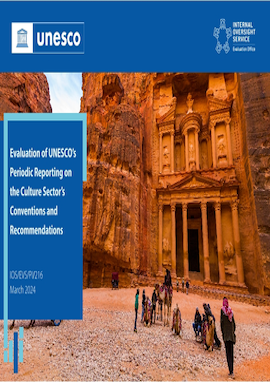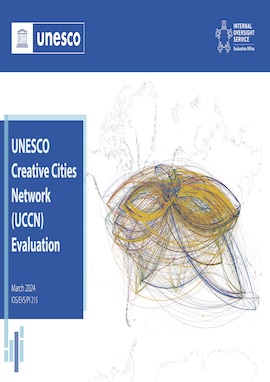Institution Background
UNESCO is the United Nations Educational, Scientific and Cultural Organization. It contributes to peace and security by promoting international cooperation in education, sciences, culture, communication and information. UNESCO promotes knowledge sharing and the free flow of ideas to accelerate mutual understanding and a more perfect knowledge of each other's lives. UNESCO's programmes contribute to the achievement of the Sustainable Development Goals defined in the 2030 Agenda, adopted by the UN General Assembly in 2015.
Evaluation Function
The UNESCO Evaluation Office is located within the Division of Internal Oversight Services (IOS) which provides an independent consolidated oversight mechanism that covers internal audit, evaluation, investigation and other management support to strengthen the functioning of the Organization.
The Evaluation Office is responsible for establishing an effective evaluation system throughout UNESCO to inform evidence-based policies and programmes and for greater accountability and organizational learning. A network of Evaluation Focal Points strengthens the decentralized evaluation system across the Organization.
Independence
The Director of IOS, who is responsible for the evaluation function in UNESCO, reports directly to the Director-General and to the Executive Board or any other governing body of the Organization. The Director has the authority to sign off on and distribute evaluation reports without prior clearance from other parties within or outside the Organization. The Director of IOS is also the owner of the evaluation budget line.
Agenda setting and planning
Evaluation plans are prepared at various levels of the Organization. The IOS Evaluation Office, in close consultation with UNESCO Programme Sectors and relevant entities, and in line with explicit decisions of the Governing Bodies, establishes a biennial corporate evaluation plan. The corporate plan is presented to the Executive Board as part of the IOS Annual Report and may be adjusted to reflect emerging organizational priorities and new projects, as well as requests from the Executive Board, other Governing Bodies and Senior Management.
Quality assurance
The IOS Evaluation Office has established quality assurance mechanisms based on relevant UNEG guidance documents, as well as a UNESCO-specific checklist with criteria for assessing quality that can be used by evaluation managers. Evaluation quality is periodically reported on in the annual Synthetic Review Report. In so doing, capacity development and/or other alternative support processes are put in place to ensure UNESCO acts on the basis of high-quality evaluations.
Use of evaluation
Enhancing use requires focusing on the needs of identified users and ensuring that their active participation in all stages of the evaluation process is a priority. It also entails: asking the right questions at the right time; guaranteeing understanding of and access to evaluation findings; and actively following up on what happens after the evaluation.
To further encourage use of evaluations, findings should be easy to access, in an appropriate format and speak in ways that meets the needs and preferences of users. Evaluation findings and recommendations should be clearly presented so that they readily understood by target audiences. In UNESCO, communications around evaluations are tailored to the different audience(s) either through reports, narrative summaries, infographics, informal presentation sessions, videos, etc. According to the Policy, all UNESCO evaluation reports are public.
Joint evaluation
UNESCO's Evaluation Office collaborates with other UN agencies to ensure that evaluation in UNESCO remains consistent with, and contributes to, United Nations policy and reforms, including supporting and participating in joint evaluations. UNESCO participates in the UNEG to advance the theory, practice, quality and usefulness of evaluation.



